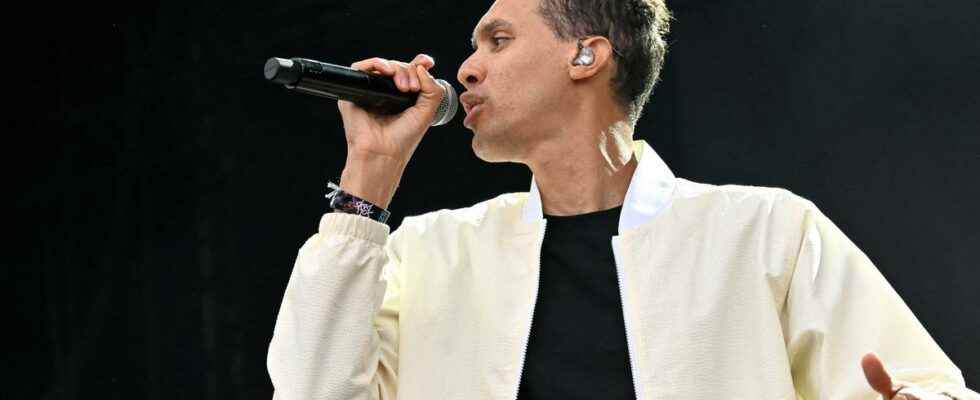In his first novel, the artist recounted the genocide of the Tutsis in Rwanda from the point of view of Gaby, a child. Already adapted to the cinema, the work is now staged by Frédéric Fisbach at the Liberté theater in Toulon.
This is the story of a book which, six years after its release, continues its journey. Already brought to the big screen in 2020 by Eric Barbier, Little country,first successful novel by the Franco-Rwandan artist Gaël Faye arrives at the theater where the director Frédéric Fisbach, by giving body and voice to the genocide of the Tutsis in Rwanda, hopes to touch the “future citizens”.
“I didn’t leave the country, I fled it, I left the door wide open behind me”: twenty years after his forced departure from Burundi, then in the throes of civil war, the narrator, Gaby, whose father is French and whose mother is a Rwandan refugee in Burundi, returns to his “little country”, in the footsteps of a childhood that was brutally shattered.
A fun show
For its staging, the playwright Frédéric Fisbach wanted to start the play with the end of the book, the post-genocide period. “We started from the end”explains the director, of whom this is the first adaptation of a novel. “Gaby finds her mother who is traumatized and he tells her their common story again”.
In the center of the stage of the Liberté theater in Toulon, a large hand-woven green woolen carpet dotted with raised clods depicts the hilly landscape of Rwanda as seen from neighboring Burundi. Above, a luminous neon traces a crest line as well as a border. “What is magnificent in Gaël Faye’s novel is that it is eminently sensual: we are in nature, there are animals, there are sounds. I absolutely wanted to be able to bring that back to the set., points out Frédéric Fisbach. To tell this story, the director worked with a choreographer: “I found that to tell this story which is not very funny, the theater had to be jubilant, it had to be playful”.
Read alsoGaël Faye, singer by accident
On the large fluffy carpet reminiscent of an activity mat, the six actors, who, in addition to different characters, all collectively embody Gabriel in the form of a choir, roll or curl up languidly. “In fact, it is a setting for the actors to play”they are “passers of words but also of sensations”, explains Frédéric Fisbach, who himself filmed in Rwanda the landscapes and natural elements projected on three screens in the background. Only Gaby’s mother is not embodied, except by the voiceover of Gaël Faye himself.
“The night was about to unleash its horde of hyenas and wild dogs” announces the choir: suddenly, the sky darkens, the row of spotlights placed at the edge of the stage panics, darkness invades the stage, and the carpet is pulled back from the stage.
I found myself faced with a novel acclaimed by young people which spoke of a recent genocide
Frédéric Fisbach, director.
The break-up of the parental couple responds to the rise of political tensions in Burundi and Rwanda, which will lead to civil war and the genocide of the Tutsis by the Hutus. The irruption of this chaotic outside world spells the end of innocence and makes Gabriel an exile.
“Rwanda is the equivalent of two Swiss cantons, about ten million people lived there at the time. Between 800,000 and a million people were killed by about three million people so it’s dizzying. It is a genocide that happened between friends, between neighbors, between relatives and these are people who continue to live together.recalls Frédéric Fisbach, who grew up backed by another genocide, that of the Shoah.
“There I found myself faced with a novel acclaimed by young people which spoke of a recent genocide”who “took place on another continent” but “with very close proximity to France”he adds. “We discover every day how much this story is part of our history”.
Political dimension
The director asserts the political dimension of his play. “I always have this fantasy when I present a project to arouse the vocations of spectators”to address myself particularly to “future citizens”further advances Frédéric Fisbach.
“You will not always be able to stay like this Gaby, neutral”says his best friend, Gino, to the narrator. “Gabriel wanted to keep a peacetime reflex, the reflex of not choosing, which was impossible”reports on the phone Gaël Faye, who now lives in Rwanda. “People who live in peace don’t realize what a luxury it is to be able to say nothing”continues the artist, in the middle of writing a new novel.
At the Le Liberté theatre, Grand Hotel – Place de la Liberté
83,000 Toulon. Tuesday 8, Wednesday 9 and Thursday 10 November at 8.30 p.m.
